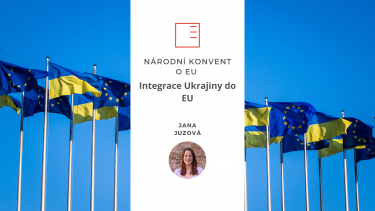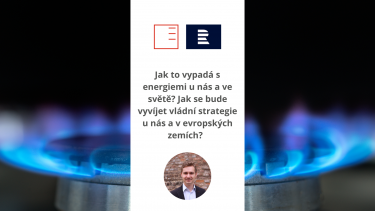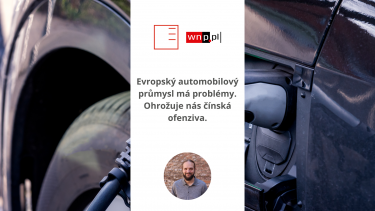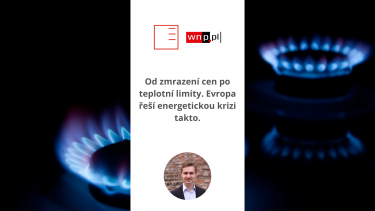iDNES.cz: Will the EU find a common solution to the energy crisis?
The current price stability of the gas market does not mean the end of problems with possible shortages. The European Commission has therefore prepared a series of measures to stabilise the market and ensure that there will be plenty of gas next year. Our senior research fellow Kateřina Davidová commented on what measures are on the table and how individual countries will respond to the crisis.
Show more
CRo Plus: Mission of Reconciliation. Why are relations between France and Germany strained?
The originally scheduled regular meeting between the governments of France and Germany was eventually postponed. Could this be a signal of some major differences in relations between the countries? What are the causes of the contradictions? Are they more personal or political? What impact could it have if Paris and Berlin fail to agree on their position on China? Our senior research fellow Vít Havelka commented on the situation between the countries in the programme Odpolední Plus for Czech Radio Plus.
Show more
MF DNES: EU to buy gas together, no price ceiling yet
European leaders agree on how to tackle the current gas situation. The solution should be joint purchases or compulsory solidarity between countries in case of emergency. Two instruments to limit the price of gas were agreed. The first is a dynamic price limit, which should moderate prices in the event of a rapid increase. The second should ensure that prices are corrected in the event of fluctuations during daily trading on the stock exchange. Our research fellow Michal Hrubý provided his view on these solutions to Mladá fronta Dnes.
Show moreČRo: What will be the first steps of the new Italian Prime Minister?
Italy has a new government headed by Giorgia Meloni. She took over from her predecessor Mario Draghi on Sunday and was sworn in by President Sergio Mattarella on Saturday. Meloni will lead Italy's most right-wing government since World War II, with Matteo Salvini of the right-wing League of the North party and Antonio Tajani of the conservative Up Italy party as her deputies. The first steps of the new Italian prime minister were outlined by our Associate Research Fellow Alexandr Lagazzi for Czech Radio.
Show more
National Convention on the EU | Integraction of Ukraine into the EU
Our Senior Research Fellow Jana Juzová has prepared a background paper for the National Convention's roundtable on the EU. The roundtable is presented with three main questions: how can the EU and the Czech Republic support Ukraine in its post-war reconstruction and reforms necessary for EU integration? What tools does the EU have at its disposal for deeper economic and political integration of Ukraine? Is the EU ready to fully integrate Ukraine and other candidate countries? Can it use the experience of previous enlargement rounds for this purpose?
Show moreCNN Prima NEWS | Cost-saving measures of EU
Our research fellow Michal Hrubý appeared on CNN Prima NEWS on the topic of EU cost saving measures. The EU proposes, for example, joint gas purchases or avoiding extreme price fluctuations.
Show moreČRo: What is the energy situation in our country and in the world? How will the government strategy evolve here and in European countries? What about the world
The International Energy Agency said in its quarterly report that Europe will face unprecedented risks regarding Russian supplies and may be forced to compete with Asia for liquefied natural gas. Our research fellow Michal Hrubý discussed the European situation, including the Czech situation in this global context, with Martina Mašková.
Show moreWNP.PL: The European car industry is in trouble. Chinese offensive threatens us.
Until a few years ago, Chinese cars were considered to be copies of European or American cars. Today, China is the largest automotive market, including in the electric car segment, and Chinese manufacturers want to establish themselves in Europe. Our research fellow Vít Havelka commented on this situation.
Show more
WNP.PL: From price freezes to temperature limits. Here's how Europe is tackling the energy crisis.
The energy crisis is forcing European governments to reduce energy consumption, but also to introduce mechanisms to protect consumers from rising heat and electricity prices. Our research fellow Michal Hrubý commented on the situation in the EU. "The Czech Republic and Italy are trying to diversify their gas supplies but have not yet decided on radical measures to reduce consumption. " "France has a problem with an ageing fleet of nuclear power stations and may not have enough electricity this winter. " "The French government, like the Czech Republic, has introduced a price cap on household energy bills and has decided to compensate the poorest households with a cost of between €100 and €200. "
Show moreE15: EU ministers will be discussing the energy crisis. Gas price caps are not expected
An emergency meeting of EU ministers will be held today to discuss the dramatic rise in energy prices. The gas price cap is unlikely to happen, but other proposals are expected to be approved. Our research fellow Michal Hrubý commented on the situation.
Show moreStaroměstské náměstí 4/1
Prague 1 - Staré Město
110 00
tel.: +420 212 246 552
email: europeum@europeum.org
https://www.europeum.org









